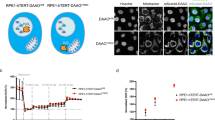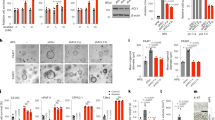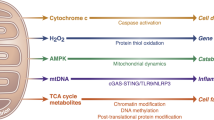Abstract
Cancer cells predominantly metabolize glucose by glycolysis to produce energy in order to meet their metabolic requirement, a phenomenon known as Warburg effect. Although Warburg effect is considered a peculiarity critical for survival and proliferation of cancer cells, the regulatory mechanisms behind this phenomenon remain incompletely understood. We report here that eukaryotic elongation factor-2 kinase (eEF-2K), a negative regulator of protein synthesis, has a critical role in promoting glycolysis in cancer cells. We showed that deficiency in eEF-2K significantly reduced the uptake of glucose and decreased the productions of lactate and adenosine triphosphate in tumor cells and in the Ras-transformed mouse embryonic fibroblasts. We further demonstrated that the promotive effect of eEF-2K on glycolysis resulted from the kinase-mediated restriction of synthesis of the protein phosphatase 2A-A (PP2A-A), a key factor that facilitates the ubiquitin–proteasomal degradation of c-Myc protein, as knockdown of eEF-2K expression led to a significant increase in PP2A-A protein synthesis and remarkable downregulation of c-Myc and pyruvate kinase M2 isoform, the key glycolytic enzyme transcriptionally activated by c-Myc. In addition, depletion of eEF-2K reduced the ability of the transformed cells to proliferate and enhanced the sensitivity of tumor cells to chemotherapy both in vitro and in vivo. These results, which uncover a role of the eEF-2K-mediated control of PP2A-A in tumor cell glycolysis, provide new insights into the regulation of the Warburg effect.
This is a preview of subscription content, access via your institution
Access options
Subscribe to this journal
Receive 50 print issues and online access
$259.00 per year
only $5.18 per issue
Buy this article
- Purchase on Springer Link
- Instant access to full article PDF
Prices may be subject to local taxes which are calculated during checkout










Similar content being viewed by others
References
Warburg O . On the origin of cancer cells. Science 1956; 123: 309–314.
Lunt SY, Vander Heiden MG . Aerobic glycolysis: meeting the metabolic requirements of cell proliferation. Annu Rev Cell Dev Biol 2011; 27: 441–464.
Ryazanov AG, Shestakova EA, Natapov PG . Phosphorylation of elongation factor 2 by EF-2 kinase affects rate of translation. Nature 1988; 334: 170–173.
Cheng Y, Li H, Ren X, Niu T, Hait WN, Yang J . Cytoprotective effect of the elongation factor-2 kinase-mediated autophagy in breast cancer cells subjected to growth factor inhibition. PLoS One 2010; 5: e9715.
Cheng Y, Ren X, Zhang Y, Patel R, Sharma A, Wu H et al. eEF-2 kinase dictates cross-talk between autophagy and apoptosis induced by Akt inhibition, thereby modulating cytotoxicity of novel Akt inhibitor MK-2206. Cancer Res 2011; 71: 2654–2663.
Cheng Y, Ren X, Zhang Y, Shan Y, Huber-Keener KJ, Zhang L et al. Integrated regulation of autophagy and apoptosis by EEF2K controls cellular fate and modulates the efficacy of curcumin and velcade against tumor cells. Autophagy 2013; 9: 208–219.
Wu H, Yang JM, Jin S, Zhang H, Hait WN . Elongation factor-2 kinase regulates autophagy in human glioblastoma cells. Cancer Res 2006; 66: 3015–3023.
Leprivier G, Remke M, Rotblat B, Dubuc A, Mateo AR, Kool M et al. The eEF2 kinase confers resistance to nutrient deprivation by blocking translation elongation. Cell 2013; 153: 1064–1079.
Bagaglio DM, Cheng EH, Gorelick FS, Mitsui K, Nairn AC, Hait WN . Phosphorylation of elongation factor 2 in normal and malignant rat glial cells. Cancer Res 1993; 53: 2260–2264.
Bagaglio DM, Hait WN . Role of calmodulin-dependent phosphorylation of elongation factor 2 in the proliferation of rat glial cells. Cell Growth Differ 1994; 5: 1403–1408.
Parmer TG, Ward MD, Yurkow EJ, Vyas VH, Kearney TJ, Hait WN . Activity and regulation by growth factors of calmodulin-dependent protein kinase III (elongation factor 2-kinase) in human breast cancer. Br J Cancer 1999; 79: 59–64.
Wang X, Regufe da Mota S, Liu R, Moore CE, Xie J, Lanucara F et al. Eukaryotic elongation factor 2 kinase activity is controlled by multiple inputs from oncogenic signaling. Mol Cell Biol 2014; 34: 4088–4103.
Mathew R, White E . Autophagy in tumorigenesis and energy metabolism: friend by day, foe by night. Curr Opin Genet Dev 2011; 21: 113–119.
Pavlides S, Vera I, Gandara R, Sneddon S, Pestell RG, Mercier I et al. Warburg meets autophagy: cancer-associated fibroblasts accelerate tumor growth and metastasis via oxidative stress, mitophagy, and aerobic glycolysis. Antioxid Redox Signal 2012; 16: 1264–1284.
Capparelli C, Guido C, Whitaker-Menezes D, Bonuccelli G, Balliet R, Pestell TG et al. Autophagy and senescence in cancer-associated fibroblasts metabolically supports tumor growth and metastasis via glycolysis and ketone production. Cell Cycle 2012; 11: 2285–2302.
Capparelli C, Whitaker-Menezes D, Guido C, Balliet R, Pestell TG, Howell A et al. CTGF drives autophagy, glycolysis and senescence in cancer-associated fibroblasts via HIF1 activation, metabolically promoting tumor growth. Cell Cycle 2012; 11: 2272–2284.
Yang Z, Fujii H, Mohan SV, Goronzy JJ, Weyand CM . Phosphofructokinase deficiency impairs ATP generation, autophagy, and redox balance in rheumatoid arthritis T cells. J Exp Med 2013; 210: 2119–2134.
Wu H, Zhu H, Liu DX, Niu TK, Ren X, Patel R et al. Silencing of elongation factor-2 kinase potentiates the effect of 2-deoxy-D-glucose against human glioma cells through blunting of autophagy. Cancer Res 2009; 69: 2453–2460.
Zhong L, D'Urso A, Toiber D, Sebastian C, Henry RE, Vadysirisack DD et al. The histone deacetylase Sirt6 regulates glucose homeostasis via Hif1alpha. Cell 2010; 140: 280–293.
Maher JC, Wangpaichitr M, Savaraj N, Kurtoglu M, Lampidis TJ . Hypoxia-inducible factor-1 confers resistance to the glycolytic inhibitor 2-deoxy-D-glucose. Mol Cancer Ther 2007; 6: 732–741.
Connolly E, Braunstein S, Formenti S, Schneider RJ . Hypoxia inhibits protein synthesis through a 4E-BP1 and elongation factor 2 kinase pathway controlled by mTOR and uncoupled in breast cancer cells. Mol Cell Biol 2006; 26: 3955–3965.
Sun Q, Chen X, Ma J, Peng H, Wang F, Zha X et al. Mammalian target of rapamycin up-regulation of pyruvate kinase isoenzyme type M2 is critical for aerobic glycolysis and tumor growth. Proc Natl Acad Sci USA 2011; 108: 4129–4134.
David CJ, Chen M, Assanah M, Canoll P, Manley JL . HnRNP proteins controlled by c-Myc deregulate pyruvate kinase mRNA splicing in cancer. Nature 2010; 463: 364–368.
Tekedereli I, Alpay SN, Tavares CD, Cobanoglu ZE, Kaoud TS, Sahin I et al. Targeted silencing of elongation factor 2 kinase suppresses growth and sensitizes tumors to doxorubicin in an orthotopic model of breast cancer. PLoS One 2012; 7: e41171.
Gregory MA, Hann SR . c-Myc proteolysis by the ubiquitin-proteasome pathway: stabilization of c-Myc in Burkitt's lymphoma cells. Mol Cell Biol 2000; 20: 2423–2435.
Yeh E, Cunningham M, Arnold H, Chasse D, Monteith T, Ivaldi G et al. A signalling pathway controlling c-Myc degradation that impacts oncogenic transformation of human cells. Nat Cell Biol 2004; 6: 308–318.
González-Terán B, Cortes JR, Manieri E, Matesanz N, Verdugo A, Rodriguez ME et al. Eukaryotic elongation factor 2 controls TNF-alpha translation in LPS-induced hepatitis. J Clin Invest 2013; 123: 164–178.
Chu HP, Liao Y, Novak JS, Hu Z, Merkin JJ, Shymkiv Y et al. Germline quality control: eEF2K stands guard to eliminate defective oocytes. Dev Cell 2014; 28: 561–572.
Arguelles S, Camandola S, Cutler RG, Ayala A, Mattson MP . Elongation factor 2 diphthamide is critical for translation of two IRES-dependent protein targets, XIAP and FGF2, under oxidative stress conditions. Free Radic Biol Med 2015; 67: 131–138.
Kenney JW, Genheden M, Moon KM, Wang X, Foster LJ, Proud CG . Eukaryotic elongation factor 2 kinase regulates the synthesis of microtubule-related proteins in neurons. J Neurochem 2016; 132: 276–284.
Simons AL, Ahmad IM, Mattson DM, Dornfeld KJ, Spitz DR . 2-Deoxy-D-glucose combined with cisplatin enhances cytotoxicity via metabolic oxidative stress in human head and neck cancer cells. Cancer Res 2007; 67: 3364–3370.
Gupta S, Mathur R, Dwarakanath BS . The glycolytic inhibitor 2-deoxy-D-glucose enhances the efficacy of etoposide in ehrlich ascites tumor-bearing mice. Cancer Biol Ther 2005; 4: 87–94.
Ben Sahra I, Laurent K, Giuliano S, Larbret F, Ponzio G, Gounon P et al. Targeting cancer cell metabolism: the combination of metformin and 2-deoxyglucose induces p53-dependent apoptosis in prostate cancer cells. Cancer Res 2010; 70: 2465–2475.
Hanahan D, Weinberg RA . Hallmarks of cancer: the next generation. Cell 2011; 144: 646–674.
Ran C, Liu H, Hitoshi Y, Israel MA . Proliferation-independent control of tumor glycolysis by PDGFR-mediated AKT activation. Cancer Res 2013; 73: 1831–1843.
Sebastian C, Zwaans BM, Silberman DM, Gymrek M, Goren A, Zhong L et al. The histone deacetylase SIRT6 is a tumor suppressor that controls cancer metabolism. Cell 2012; 151: 1185–1199.
Cairns RA, Harris IS, Mak TW . Regulation of cancer cell metabolism. Nat Rev Cancer 2011; 11: 85–95.
Fu X, Zhu MJ, Dodson MV, Du M . AMP-activated protein kinase stimulates Warburg-like glycolysis and activation of satellite cells during muscle regeneration. J Biol Chem 2015; 290: 26445–26456.
Faubert B, Boily G, Izreig S, Griss T, Samborska B, Dong Z et al. AMPK is a negative regulator of the Warburg effect and suppresses tumor growth in vivo. Cell Metab 2013; 17: 113–124.
Browne GJ, Finn SG, Proud CG . Stimulation of the AMP-activated protein kinase leads to activation of eukaryotic elongation factor 2 kinase and to its phosphorylation at a novel site, serine 398. J Biol Chem 2004; 279: 12220–12231.
Proud CG . Regulation and roles of elongation factor 2 kinase. Biochem Soc Trans 2015; 43: 328–332.
Xie J, Mikolajek H, Pigott CR, Hooper KJ, Mellows T, Moore CE et al. Molecular mechanism for the control of eukaryotic elongation factor 2 kinase by pH: role in cancer cell survival. Mol Cell Biol 2015; 35: 1805–1824.
Moore CE, Mikolajek H, Regufe da Mota S, Wang X, Kenney JW, Werner JM et al. Elongation factor 2 kinase is regulated by proline hydroxylation and protects cells during hypoxia. Mol Cell Biol 2015; 35: 1788–1804.
Kenney JW, Moore CE, Wang X, Proud CG . Eukaryotic elongation factor 2 kinase, an unusual enzyme with multiple roles. Adv Biol Regul 2014; 55: 15–27.
Redpath NT, Proud CG . Cyclic AMP-dependent protein kinase phosphorylates rabbit reticulocyte elongation factor-2 kinase and induces calcium-independent activity. Biochem J 1993; 293: (Pt 1) 31–34.
Diggle TA, Subkhankulova T, Lilley KS, Shikotra N, Willis AE, Redpath NT . Phosphorylation of elongation factor-2 kinase on serine 499 by cAMP-dependent protein kinase induces Ca2+/calmodulin-independent activity. Biochem J 2001; 353: 621–626.
Wang X, Xie J, da Mota SR, Moore CE, Proud CG . Regulated stability of eukaryotic elongation factor 2 kinase requires intrinsic but not ongoing activity. Biochem J 2015; 467: 321–331.
Yang W, Xia Y, Cao Y, Zheng Y, Bu W, Zhang L et al. EGFR-induced and PKCepsilon monoubiquitylation-dependent NF-kappaB activation upregulates PKM2 expression and promotes tumorigenesis. Mol Cell 2012; 48: 771–784.
Yang W, Zheng Y, Xia Y, Ji H, Chen X, Guo F et al. ERK1/2-dependent phosphorylation and nuclear translocation of PKM2 promotes the Warburg effect. Nat Cell Biol 2012; 14: 1295–1304.
Wang YH, Israelsen WJ, Lee D, Yu VW, Jeanson NT, Clish CB et al. Cell-state-specific metabolic dependency in hematopoiesis and leukemogenesis. Cell 2014; 158: 1309–1323.
Yang W, Xia Y, Hawke D, Li X, Liang J, Xing D et al. PKM2 phosphorylates histone H3 and promotes gene transcription and tumorigenesis. Cell 2012; 150: 685–696.
Noguchi T, Inoue H, Tanaka T . The M1- and M2-type isozymes of rat pyruvate kinase are produced from the same gene by alternative RNA splicing. J Biol Chem 1986; 261: 13807–13812.
Sears R, Nuckolls F, Haura E, Taya Y, Tamai K, Nevins JR . Multiple Ras-dependent phosphorylation pathways regulate Myc protein stability. Genes Dev 2000; 14: 2501–2514.
Cheng Y, Ren X, Gowda AS, Shan Y, Zhang L, Yuan YS et al. Interaction of Sirt3 with OGG1 contributes to repair of mitochondrial DNA and protects from apoptotic cell death under oxidative stress. Cell Death Dis 2013; 4: e731.
Jorgensen R, Ortiz PA, Carr-Schmid A, Nissen P, Kinzy TG, Andersen GR . Two crystal structures demonstrate large conformational changes in the eukaryotic ribosomal translocase. Nat Struct Biol 2003; 10: 379–385.
Acknowledgements
We sincerely thank Dr Zhimin Lu (MD Anderson Cancer Center, USA) and Drs Jing Chen and Taro Hitosugi (Emory University School of Medicine) for PKM2 plasmids, Dr Christopher Proud (University of Southampton, UK) for eEF-2K plasmid and Dr Jayanta Debnath (University of California San Francisco, USA) for H-RasV12 retroviral plasmid. This work was supported by grants from the National Basic Research Program of China (973 Program) 2015CB910700 (to YC), 2014CB542400 (to AFC); the National Natural Science Foundation of China 81422051, 81472593 and 31401208 (to YC); the National Basic Research Program of China 2015CB553903 (to YT) and the National Natural Science Foundation of China 81372427 (to YT); the US Department of Defense BC103654 (to YC); and the US Public Health Service NIH/NCI R01CA135038 (to J-MY).
Author information
Authors and Affiliations
Corresponding authors
Ethics declarations
Competing interests
The authors declare no conflict of interest.
Additional information
Supplementary Information accompanies this paper on the Oncogene website
Supplementary information
Rights and permissions
About this article
Cite this article
Cheng, Y., Ren, X., Yuan, Y. et al. eEF-2 kinase is a critical regulator of Warburg effect through controlling PP2A-A synthesis. Oncogene 35, 6293–6308 (2016). https://doi.org/10.1038/onc.2016.166
Received:
Revised:
Accepted:
Published:
Issue Date:
DOI: https://doi.org/10.1038/onc.2016.166
This article is cited by
-
Combined treatment of mitoxantrone sensitizes breast cancer cells to rapalogs through blocking eEF-2K-mediated activation of Akt and autophagy
Cell Death & Disease (2020)
-
Tubeimoside-1, a triterpenoid saponin, induces cytoprotective autophagy in human breast cancer cells in vitro via Akt-mediated pathway
Acta Pharmacologica Sinica (2019)
-
Nucleus accumbens-associated protein-1 promotes glycolysis and survival of hypoxic tumor cells via the HDAC4-HIF-1α axis
Oncogene (2017)
-
Anticancer strategies based on the metabolic profile of tumor cells: therapeutic targeting of the Warburg effect
Acta Pharmacologica Sinica (2016)



